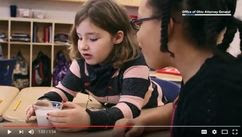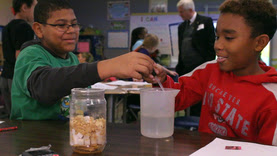Criminal justice curriculum available for Ohio students

REYNOLDSBURG, Ohio – Ohio Attorney General Mike DeWine announced today that the Bureau of Criminal Investigation (BCI) Science School is now available to teachers and students across Ohio.

Designed for fourth graders, BCI Science School’s free lesson plans will expose students to the careers of forensic science, criminal investigation, and related careers at an early age. Students conduct hands-on, inquiry-based experiments in class and solve relevant challenges using critical thinking and problem-solving skills. Videos are shown throughout the lessons that “take” students into the field with BCI agents and into the laboratory with forensic scientists.
“I wanted to develop BCI Science School so kids could experience what it’s like to be a detective or a forensic scientist. We hope that by showing kids when they are young all that BCI has to offer, we will spark their interest in science and criminal justice careers that they might not have thought about,” said Attorney General Mike DeWine. “Since we can’t take every fourth grade student and teacher to BCI, where they are solving crimes every single day, we thought creatively about what we could do to make BCI available to teachers and students to accomplish our goal of early learning and excitement for science and related fields.”
Today, Attorney General DeWine visited fourth grade students at Herbert Mills STEM Elementary School in Reynoldsburg (Franklin County), who worked on extension projects, after finishing the main BCI Science School curriculum.

“Our teachers and students are thrilled to partner with the BCI Science School for a hands-on, applied learning experience,” said Brian Coffey, Herbert Mills STEM Elementary Principal. “Not only is this a perfect fit with our climate of student growth and learning, but we are excited to introduce the fourth grade to a variety of career pathways including forensics.”
With a STEAM-based (Science, Technology, Engineering, Arts, and Mathematics) curriculum, BCI Science School includes 26 lesson plans aligned to the Ohio Department of Education’s fourth grade standards, using hands-on experiments and inquiry-based learning to help solve fictional crimes. Students help “solve” this scenario:
A farmer named Bob Agriculture is missing, along with his dog, Buckeye. Bob’s wife calls police when she can’t find the two and notices their barn has been broken into, chemicals are missing, and there’s a threatening note on the barn window. Students help figure out what happened to Bob Agriculture and who might be responsible. They determine if any crimes were committed.
In the process, students learn about key processes used at BCI:
- Cyber Crimes (cell phone pinging and cell phone records)
- Thermal Energy Detection
- Criminal Intelligence Unit (tracking suspects)
- Crime Scene (collecting evidence)
- Latent Prints (fingerprints)
- DNA
- Questioned Documents (handwriting)
- Chemistry (chromatography)
- Trace Evidence (fracture matches and shoeprints)

- Toolmarks
BCI Science School was designed to be flexible to fit an individual teacher’s needs. For example, some teachers complete one lesson every day and some teachers opt for one lesson every week. While the curriculum was developed for the fourth grade classroom environment, BCI Science School could easily be adapted for after-school programs, summer camps, and homeschool settings.
Teachers with questions about implementing BCI Science School in their classrooms can contact [email protected].









